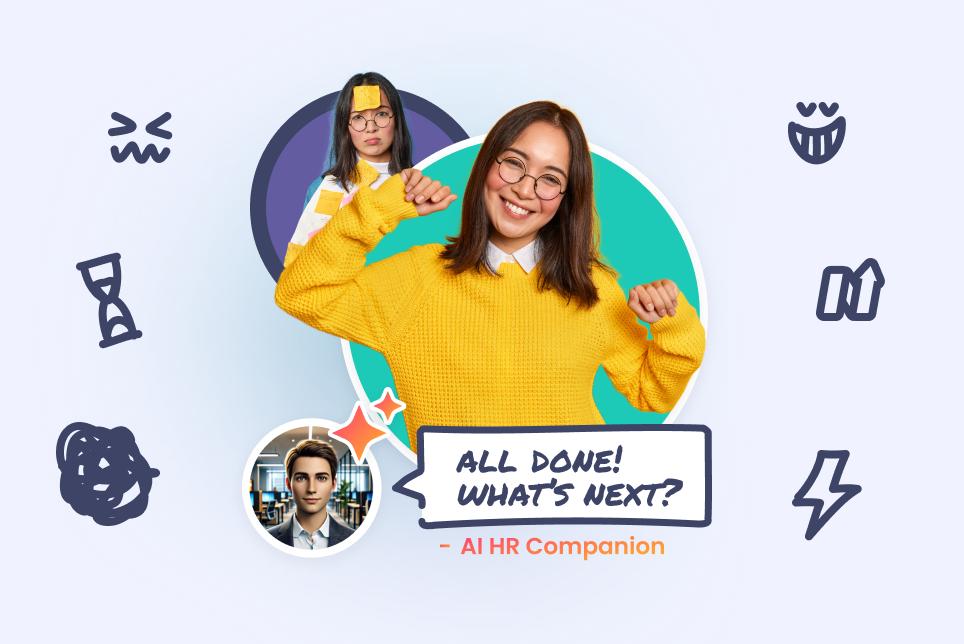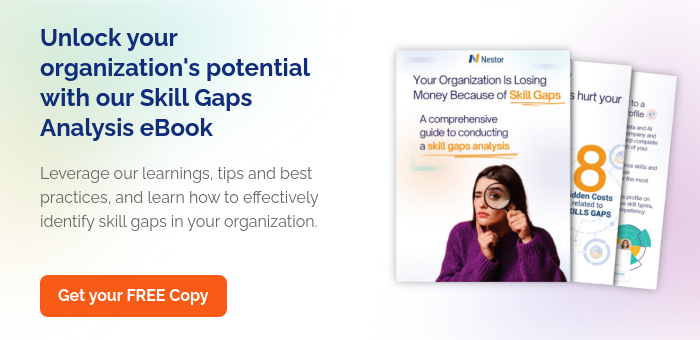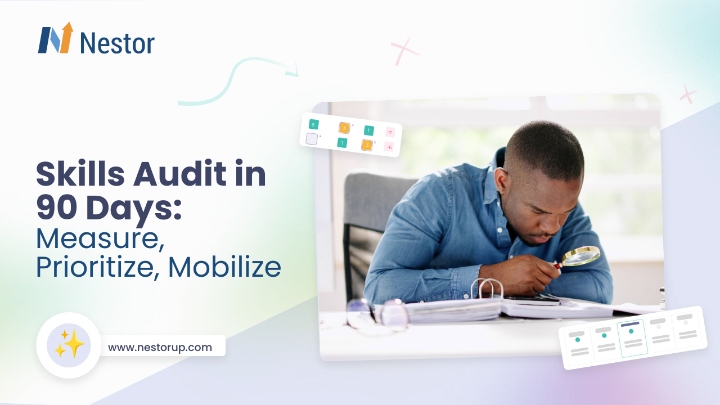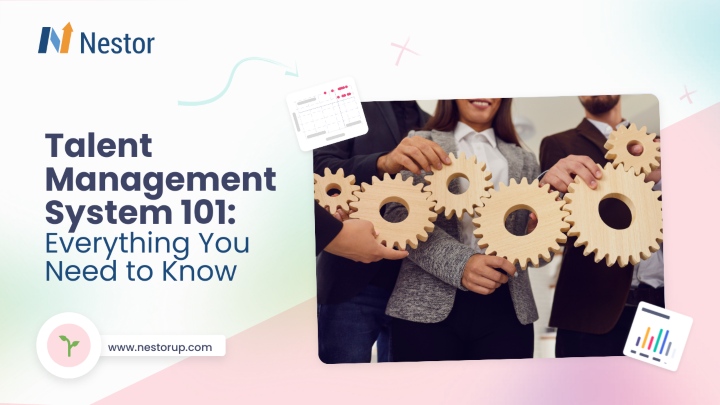
The current and future world of work is best characterized by uncertainty and continuous development, in large part driven by technological breakthroughs (ChatGPT for example) and new ways of seeing, understanding, and doing work. And in such a rapidly evolving context, it’s no wonder skills gaps have become one of the most pressing concerns for organizations across the globe.
The relevancy and urgency of addressing skills gaps are reinforced by various studies and insights, which reveal, on the one hand, the negative impact on organizations and, on the other hand, the fact that these gaps are widening, instead of shrinking.
For instance, the World Economic Forum’s Future of Jobs Report 2023 has revealed that “44% of workers’ core skills are expected to change in the next five years.”
If you’re still not convinced that addressing skills gaps has become a business imperative, let’s look at the main hidden costs and impact of not dealing with them. Before diving in, you should know that the impact and side effects can vary significantly depending on how wide the skills gaps are in your company, so the costs listed below may or may not apply to you.
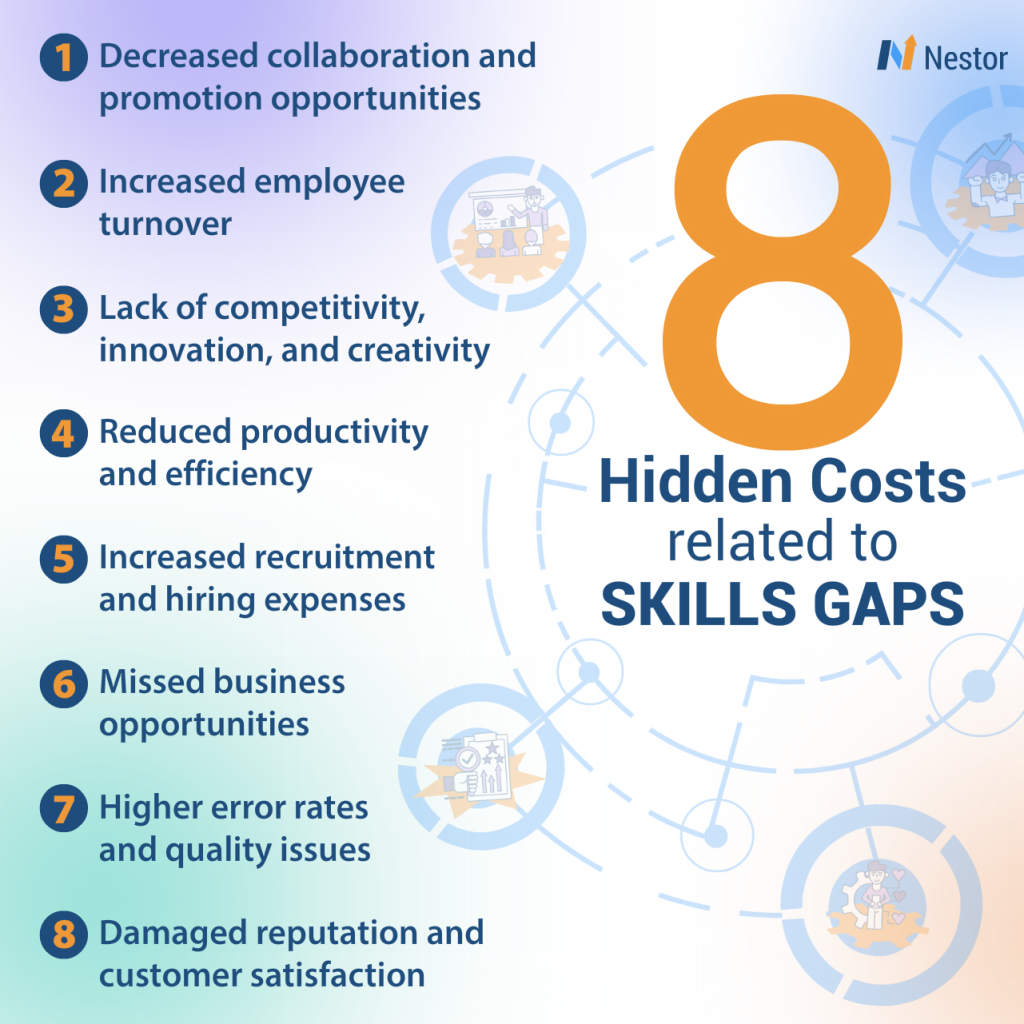
Reduced productivity and efficiency
Decreased productivity and overall performance are the natural result of a gap between the skills required for a job and the skills people actually have. And when employees struggle, the company’s achievements and business goals will suffer.
Digital skills gaps are perhaps the most relevant example in this situation. Without knowing how to make the most out of the available technologies and tools:
- workers’ tasks will take longer than needed
- people’s confidence in their own ability and competence will decrease
- the company’s investment in new technologies won’t be maximized
- both employees and employers will become less competitive in time
Increased employee turnover
Employees who lack the necessary skills (and development opportunities) to fulfill their roles can easily become overwhelmed, frustrated, and disengaged. As a result, their morale can decline, impacting their overall job satisfaction and commitment to the organization.
While different people will have different needs and expectations, Gen Z and millennial workers are the most likely to look out for other opportunities if their aspirations for growth aren’t supported.
This is highlighted in LinkedIn’s 2023 Workplace Learning Report, which reveals the top 5 factors when considering a new job:
- compensation and benefits
- flexibility to work when and where I want
- challenging and impactful work
- opportunities for career growth within the company
- opportunities to learn and develop new skills
Lack of competitivity, innovation, and creativity
Depending on how wide skills gaps are, they can severely limit people’s ability to think critically, innovate, or find unique approaches to problems. And it’s easy to see how an organization will lose its competitive edge in this context, especially in industries where skills are the key differentiator.
Skills gaps will also hinder any efforts to stay competitive and adapt to the ever-changing market and customer expectations. And this has never been more true than now when we are arguably going through what some call The Forth Industrial Revolution.
Decreased collaboration and promotion
The lack of soft or human skills — such as communication, teamwork, and problem-solving — will limit the ability of employees to collaborate with colleagues and positively contribute to team dynamics. In time, this will lead to strained relationships, miscommunication, and a lack of synergy among team members.
In terms of promotion, soft skills are needed to facilitate clear communication between employees and their managers, just as negotiation is needed for salary increases or additional responsibilities. A lack of human skills will also prevent most people from taking on leadership positions since they are an essential requirement.
Higher error rates and quality issues
When employees don’t have the necessary skills or knowledge to perform at their best, they are more prone to:
- making mistakes
- overlooking crucial details
- failing to meet quality standards
This, in turn, can result in unnecessary rework, customer complaints, or in some cases even legal consequences, depending on the severity of the errors.
It’s also worth pointing out that the costs associated with solving these issues are usually higher (both in terms of finances and time), which is why an initial proactive approach of upskilling or reskilling employees turns out to be both more cost-effective and more beneficial.
Increased recruitment and hiring expenses
When not addressed in time, skills gaps can determine organizations and HR departments to resort to external recruitment. Not only does this often prolong recruitment cycles and time-to-fill vacancies, but it also involves more expenses, including but not limited to:
- job advertisements
- recruitment agency fees
- background checks
- screening and interview candidates
External higher are also more likely to expect higher compensation packages and do not always align with the pre-existing company culture.
The urgency associated with skills gaps could also determine organizations to look at temporary or contract workers. While this short-term solution might work, it can turn out to be costlier in the long run.
These workers could come with higher hourly rates or simply fail to collaborate well with full-time employees. The entire situation also perpetuates a lack of organizational continuity and cohesion and decreases the morale of existing workers, who realize the company’s more willing to invest externally than in their development.
Missed business opportunities
To seize new opportunities in a rapidly evolving business landscape, organizations need to remain agile and adaptable — and this is difficult to achieve when skills gaps limit the potential of your workforce.
While missed business opportunities can take various forms, they usually come down to a lack of skills, knowledge, or initiative from people in managerial roles or sales departments (who are often so busy with their tasks and KPIs, that upskilling isn’t even on the table):
- Inability to pursue new markets: For example, it’s hard to establish a strong online presence when people lack digital marketing skills.
- Inadequate response to market trends: When employees lack expertise in (or aren’t encouraged to explore) emerging technologies, companies will struggle to leverage new business models and tools in their effort to respond effectively to market dynamics.
- Inefficient utilization of resources: Lack of management or leadership skills will affect an organization’s ability to deliver on time (or what’s expected), which is a surefire way of losing potential clients and business partners.
Damaged reputation and customer satisfaction
On the one hand, skills gaps and the lack of initiatives (like internal mobility) to address them will make companies less attractive employers, making it harder to bring in top talent.
On the other hand, a lack of skills will also impact the ability to deliver high-quality products and services, which inevitably leads to dissatisfied customers and a negative brand image.
And since word of mouth is often considered the best form of advertising, investing in employees and their development is crucial to mitigate the potential damage to reputation and customer satisfaction.
How Nestor can help you deal with skills gaps
Nestor’s People Intelligence Platform will empower you to address skills gaps and prevent the additional costs associated with them.
Our solution is designed from the ground up to help organizations unlock the Power of Skills and drive workforce agility, high performance, and continuous growth.
We drive competitiveness and change by focusing on dynamic employee skills profiles. With our approach, you will:
- identify evolving skill needs
- track and evaluate skill levels
- match skill supply and demand
- develop and grow both organizational and people capabilities
Together, we’ll unleash the full potential of your workforce and we’ll ensure your organization has the right skills for the challenges of today and tomorrow. If you want to learn more about how Nestor can help you, schedule a demo session.






